Day hiking in Tierra del Fuego
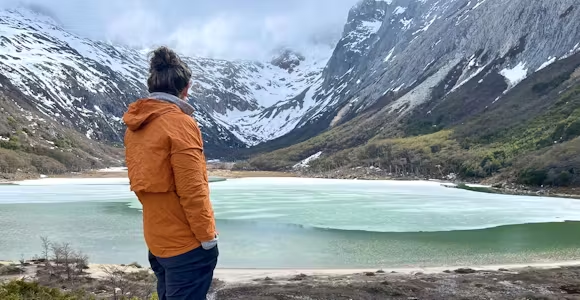
Tierra del Fuego is a land of mountains, lakes and glaciers that are perfect for day hikes, from a base in Ushuaia or Navarino Island.
Discover MoreDeep roots in Patagonia: We are ex-guides, tour leaders, outdoor enthusiasts, & adventurers.
We’ve got our feet on the ground: Impartial advice, a bespoke service, and at no extra cost.
For the ends of the Earth: Sustainability is more than our carbon footprint (but we’re reducing that too).
Deep roots in Patagonia: We are ex-guides, tour leaders, outdoor enthusiasts, & adventurers.
We’ve got our feet on the ground: Impartial advice, a bespoke service, and at no extra cost.
For the ends of the Earth: Sustainability is more than our carbon footprint (but we’re reducing that too).

Tierra del Fuego is Patagonia's 'land of fire' where the map runs out, with only the ocean separating you from Antarctica. But what a way to come to the end of the road: it's a place for adventure, with epic mountain hikes, thick forests, remote glaciers, and seeing penguins on lonely islands as condors wheel high above.
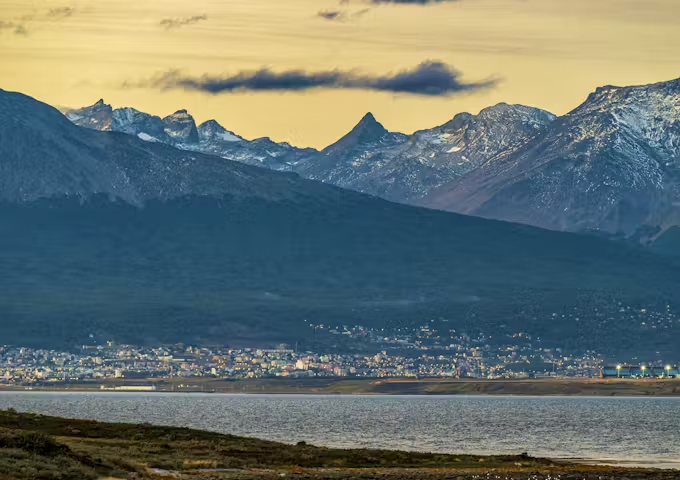
Ushuaia, the southernmost city in the world
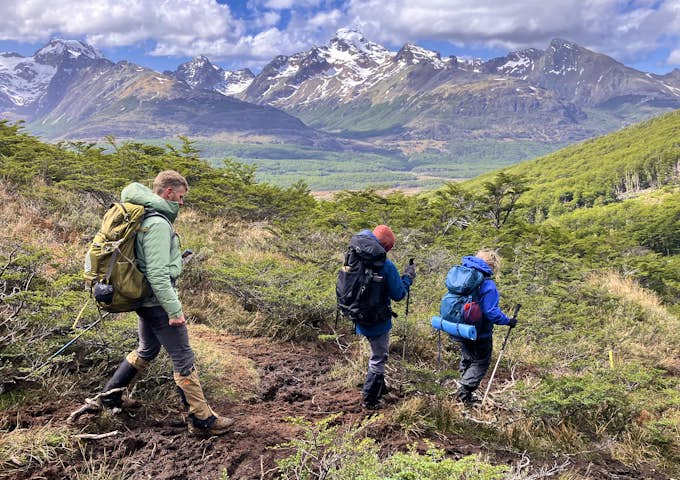
Torres del Río Chico trek
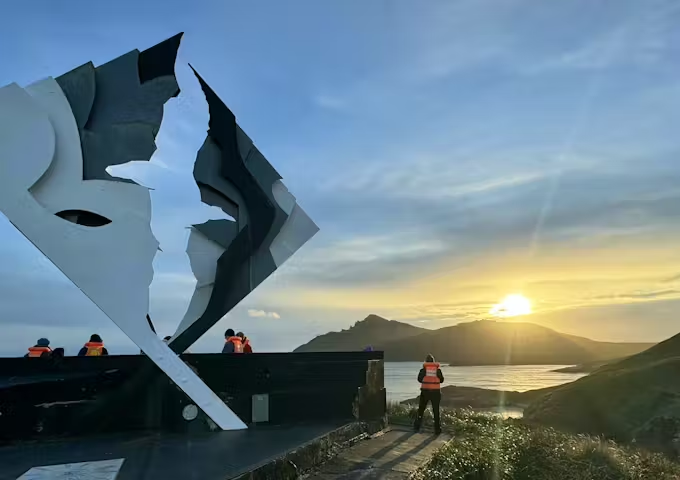
Cape Horn monument
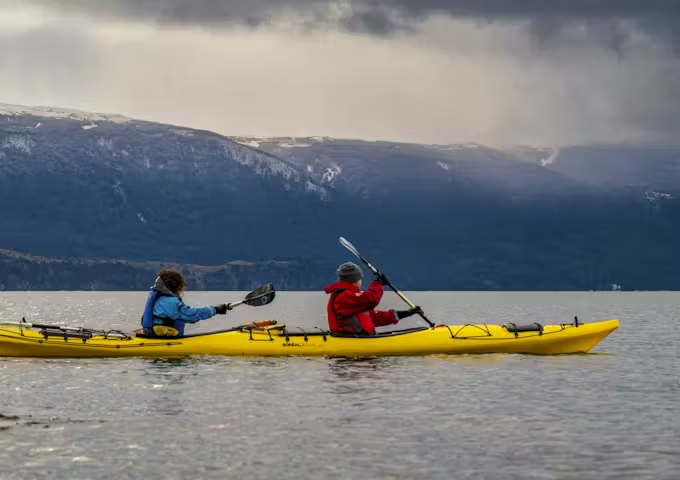
Kayaking on the edge of the Beagle Channel
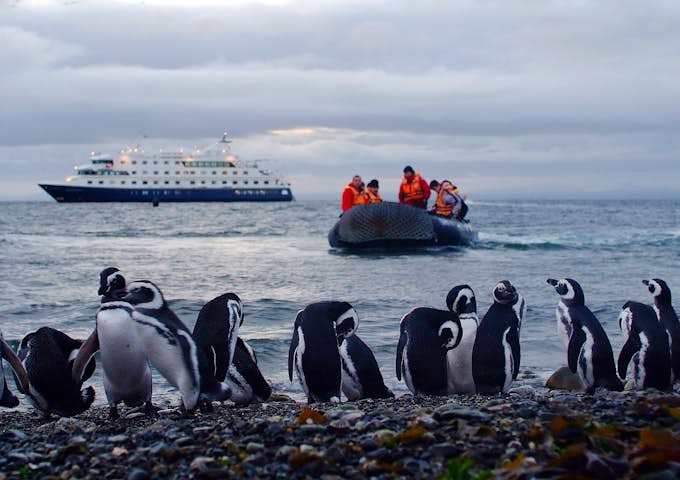
Magellanic Penguins, Isla Magdalena
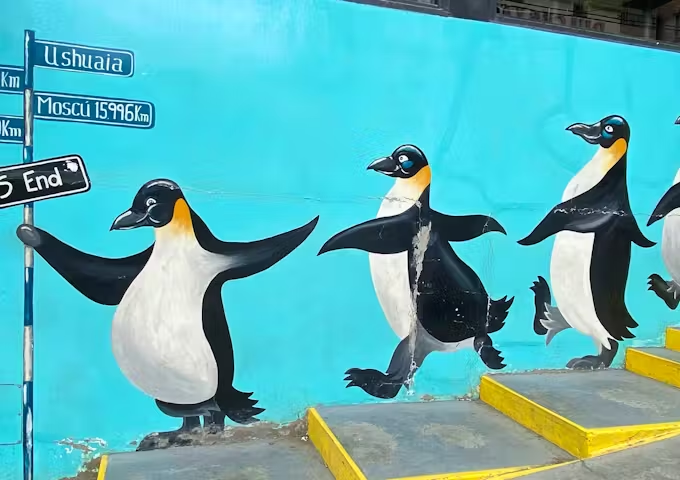
Street art in Ushuaia
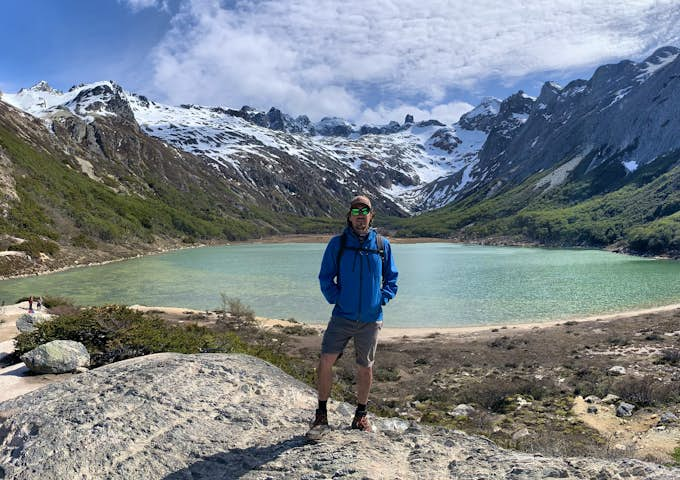
Laguna Esmeralda hike
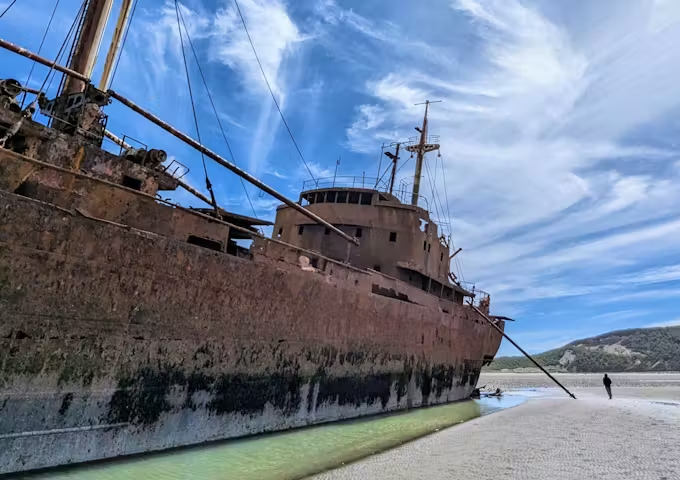
Shipwreck at Cabo San Pablo
Hikers and trekkers are starting to discover that Tierra del Fuego has some of the most exciting – and least explored – mountains in Patagonia.
The main gateway city of Ushuaia is perfectly placed for easy and spectacular day hikes to mountain lakes and glaciers. Alternatively, you can push yourself on one of Tierra del Fuego’s stunning multi-day treks, where you can truly leave the crowds behind to get deep in the wilderness – crossing glaciers on the Sierra Valdivieso Circuit or exploring the high passes of the Torres del Río Chico Trek.
Navarino Island holds an even more allure, with the southernmost trek in the world on a circuit through the Dientes de Navarino mountains.

Hiking near Ushuaia
Tierra del Fuego consists of one massive island that’s fringed by an archipelago of smaller islets, making an adventure cruise the best way to explore. These small ship cruises sail between Ushuaia and Punta Arenas, exploring landscapes that would otherwise be impossible to reach.
They sail to coastlines fringed with forest-clad mountains, where glaciers descend from great heights down to sea, to penguin colonies on lonely islands and even Cape Horn itself.
Daily zodiac excursions offer plenty of opportunities for hiking in some of the remotest locations on the planet.
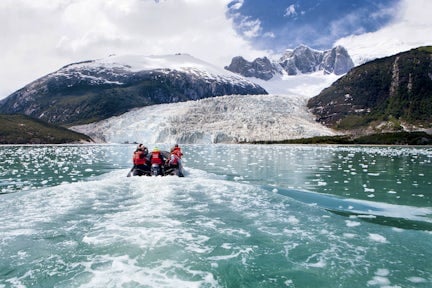
Glacier cruising in Tierra del Fuego
Tierra del Fuego’s landscapes are incredibly diverse, ranging from mountains, forest and steppe to a long coastline that connects the land to the Southern Ocean. This offers up an excitingly varied wildlife watching experience.
The most attractive species are those associated with the sea and the great south: there are Magellanic penguins and South America’s only colony of king penguins. Sea lions throng the Beagle Channel while albatrosses fly above, and at the right time of year there are humpback whales.
In land, the woods and mountains offer terrific birdwatching, from the mighty condor to the charming Magellanic woodpecker, with a plenty of species to tick off on a life list.
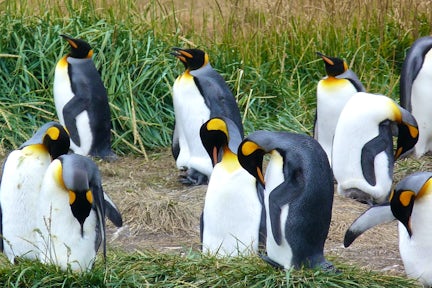
King penguins at Porvenir
Tierra del Fuego isn’t just a destination for adventure travellers, it has a rich history and culture to explore.
Ushuaia was founded as a penal colony, and has an excellent prison-turned-museum as well as the jaunty Fin del Mundo train in nearby Tierra del Fuego National Park. Outside the city, old shipwrecks litter the coast, and the historic Estancia Harberton tells of the early lives of colonists and their interactions with the indigenous Yaghan people – a story that continues on Navarino Island, where the majority of Yaghan live today.
When you’re done, finish your experience by tasting some of the best seafood in South America, freshly caught from the Beagle Channel.

Beagle Channel gastronomy

Tierra del Fuego is a land of mountains, lakes and glaciers that are perfect for day hikes, from a base in Ushuaia or Navarino Island.
Discover More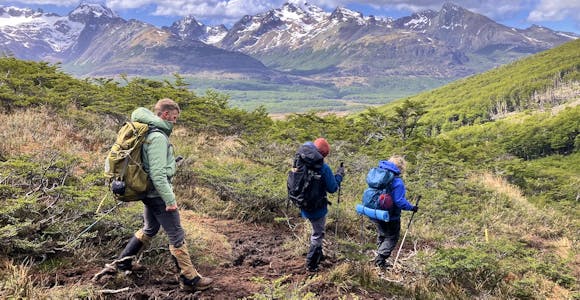
Tierra del Fuego is home to some of Patagonia’s most remote and rewarding multi-day hikes, trekking in the Cordillera Darwin and Dientes de Navarino mountain ranges.
Discover More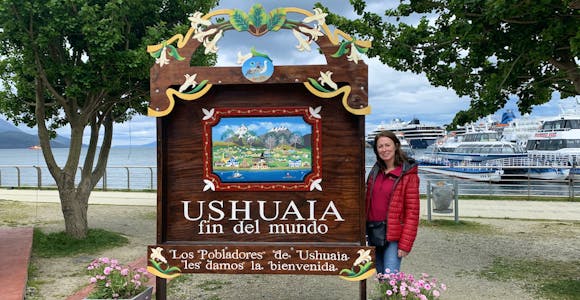
Ushuaia is the southernmost city in the world, squeezed between the mountains and sea, and a perfect base for hiking and glacier cruising.
Discover More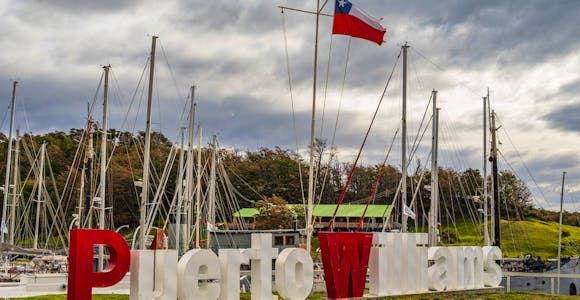
Navarino Island in the Beagle Channel is Chile’s own end of the world, full of wild mountains and bays waiting to be explored from the town of Puerto Williams.
Discover More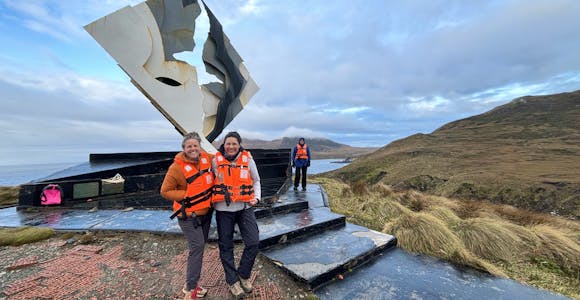
Cape Horn is South America’s final lonely outpost in the ocean. Shrouded in the myth and romance of the sea, it’s accessible only by adventure cruise ship.
Discover More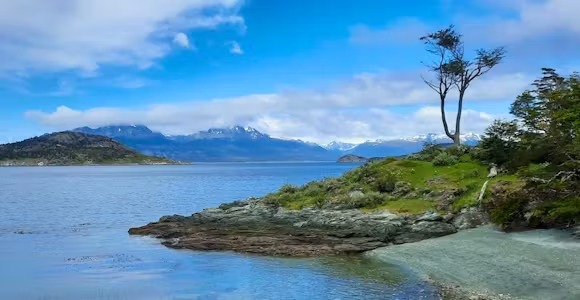
Tierra del Fuego National Park is easily accessible from Ushuaia, with walking trails along the Beagle Channel, excellent birdwatcihng and the Fin del Mundo train.
Discover MoreUnsure whether to head for the Argentinian or the Chilean part of Tierra del Fuego? Why not both? The two halves of this amazing destination not combine well, but their gateway cities allow Tierra del Fuego to easily fit into a wider Patagonia itinerary - especially Torres del Paine or Los Glaciares.
Tierra del Fuego trips scored 4.5/5 from 488 reviews
The hike in TdF was an amazing experience. The guides, organisation and scenery were fantastic. The tour exceeded our expectations. Read the full review
Travelled: December 2023
Marc Jansen - UK
Fantastic - the variation in the topography was incredible from snow, to desert like, to lush green - an amazing amount of wildlife diversity as well. Absolutely beautiful which was probably helped by great weather Read the full review
Travelled: February 2023
Catherine Drury - USA
The whole region is wild and beautiful, full of the memories of incredibly brave early explorers. We were privileged to be able to follow the different straits and see mountains, glaciers, penguins, a whale, dolphins, seals...and walk in beautiful woodlands...and enjoy the adventure of all the landings in small rubber zodiac boats. Read the full review
Travelled: February 2023
Peter Heywood - UK
The remoteness of Tierra del Fuego was incredible, we didn't see another boat for 3 days. We saw a lot of wildlife - penguins, dolphins, seals, albatross, condors.
Travelled: January 2017
Peter -
The catamaran trip east down the Beagle Channel was a spellbinding introduction to the region; dramatically beautiful with wind-whipped blue sea flanked by snow-capped rugged mountains; island hopping to view sea birds, penguins, seals etc very rewarding.
Travelled: November 2016
Michael - UK
We flew down to Isla Navarino which was fabulous. Lakutaia Lodge was a great base with an amazing location overlooking the Beagle channel. We took a boat trip around to Wulaia Bay which was fascinating.
Travelled: February 2016
Neil -
Many thanks for making my unforgettable experience in Tierra del Fuego possible. The land is one of a kind; the only regret I have that I was not able to go for more days!
Travelled: December 2015
Christian -
Review:
The majority of visitors to Tierra del Fuego base themselves in Ushuaia, where there is a wide variety of places to stay, from simple guesthouses to high end hotels high above the town to boutique places nestled on the Beagle Channel. Punta Arenas is a good alternative hub with hotels to suit all different types of traveller.
There is just one accommodation option on Navarino Island – but happily it’s one of Patagonia’s best ecolodges, just outside Puerto Williams.
A third option is to travel in a floating hotel by taking a cabin on a small ship adventure cruise, which sail in both directions between Ushuaia and Punta Arenas via Cape Horn.
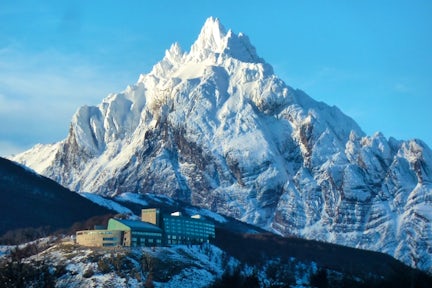
Ushuaia (airport code USH) is the main gateway to Tierra del Fuego, with connections to Argentina’s capital Buenos Aires and El Calafate (FTE) for Los Glaciares. Ushuaia is also a port of call (along with Punta Arenas) for adventure cruises around Tierra del Fuego, as well as cruises to Antarctica.
Chilean Tierra del Fuego can be accessed via Punta Arenas (PUQ), which has flights to Puerto Williams (WPU) on Navarino Island. Punta Arenas and Ushuaia are well-connected by road, while ferries link Puerto Williams and Ushuaia.

Spring The start of the visitor season starts late in Tierra del Fuego, with plenty of snow and ice around in many places, but trails open and Magellanic penguins return from a winter at sea
Summer December and January are the ideal time to explore Tierra del Fuego, with long days and the mildest weather.
Autumn From mid-February to April, the crowds thin and you'll have the sights almost to yourself. The autumn colours come out and the forests blaze with red and gold
Winter A thick layer of snow covers the landscape. The cruise ships stop sailing as ski resorts open and winter sports become the main attraction.
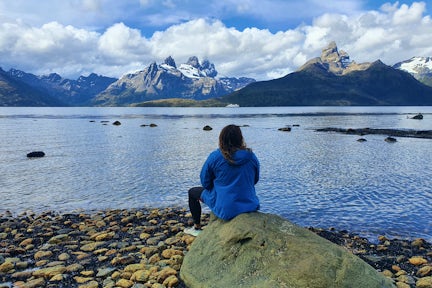

Torres del Paine National Park, with its iconic granite Towers, is one of Patagonia's most popular destinations: a paradise for hikers and outdoor adventure activities.
Discover More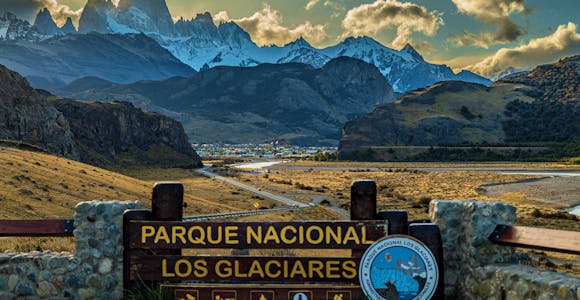
Los Glaciares is Argentina’s greatest national park. It’s home to Perito Moreno glacier and the Fitz Roy Massif, offering visitors explore epic ice and world-class hiking.
Discover More
Combining shimmering lakes, jagged peaks, white water rapids and biking trails, the Argentine Lake District has something for every traveller.
Discover More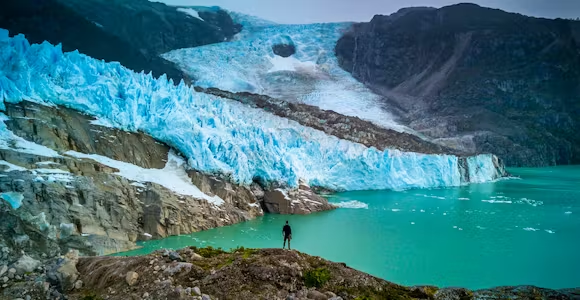
Remote, beautiful and with one of the most famous road-trip roads in the world, Aysen is a destination for those seeking the very best of Patagonia without the crowds.
Discover MoreWe are guides, guardians, and travellers with over 400,000 hours of lived experience in Patagonia.
From a world of options, we’ll help you discover your perfect trip.
We care deeply about protecting Patagonia, that’s why 1% of our revenue goes to conservation.
Our dedicated support throughout will make sure you have the experience of a lifetime.
We'll spend some time listening to your aspirations, then discuss the kind of experience that might suit you.
Next we'll discuss the options, shortlist the best trips for you and present you our impartial recommendations.
We'll place a 24 hour hold on your preferred option - without obligation - whilst we talk through the details.
Whatever your budget, group size, length of stay, preferred activity or appetite for adventure, we can help.
1-888-970-4571This website uses cookies to ensure you get the best experience on our website. Privacy policy